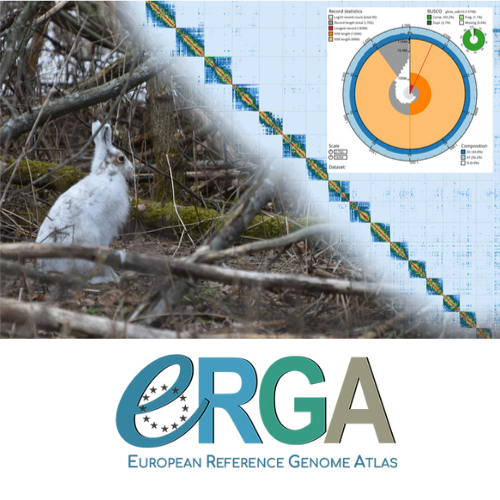Review: 1

Chromosome-level reference genome assembly for the mountain hare (Lepus timidus)
The genomic foundations of adaptation: evaluating the mountain hare
Recommended by Jitendra Narayan based on reviews by Theodore Squires and 1 anonymous reviewerFekete et al. (2024) generated a chromosome-level reference genome assembly for the mountain hare (Lepus timidus). This represents a significant advancement in genomic research for non-model organisms, achieving high quality through advanced sequencing and curation techniques. This achievement serves as a foundational blueprint for future efforts in other species, particularly those with ecological or evolutionary importance. The assembly has high continuity and completeness, with an N50 scaffold length of 125.8 Mb and a contig N50 of 4.9 Mb, meeting the Earth BioGenome Project's stringent criteria for reference-grade genomes (Mc Cartney et al., 2024). The combination of PacBio HiFi sequencing and Hi-C scaffolding techniques enabled robust assembly and chromosomal scaffolding of all 23 autosomes and the X and Y sex chromosomes. Additionally, manual curation enhanced the assembly quality, accurately representing genomic sequences. Although the genome provides valuable structural insights, the limited functional annotations highlight a need for further investigation into the genetic underpinnings of the ecological and adaptive traits of the mountain hare.
The ecological and evolutionary implications of resolving this genome are considerable, particularly given the mountain hare’s adaptations to cold, snowy environments and its role in boreal ecosystems. The assembly facilitates the study of adaptations, such as camouflage and snowshoe-like feet, which are critical for survival in its rapidly changing habitat. Comparative genomic analyses reveal the evolutionary relationship between Lepus timidus and closely related species, such as the brown hare (L. europaeus) and Irish hare (L. t. hibernicus), providing insights into gene flow, hybridization, and speciation. These findings have practical implications for conservation genetics, particularly for subspecies threatened by habitat loss and climate change. However, the study does not identify specific adaptive loci or functional variants, limiting its immediate applicability to understanding the molecular basis of traits crucial for survival in extreme environments. Expanding the functional annotation of this genome would significantly enhance its utility in conservation and ecological genomics. Moreover, the high repetitive element content (42.35%) underscores the need for detailed annotation to facilitate downstream studies. These issues suggest that additional refinement and validation are warranted. Despite these limitations, the assembly is invaluable for studying genetic adaptations, hybridization, and hare conservation. Future research should focus on functional annotation, population-level comparisons, and targeted studies of ecological traits to fully realize the potential of this high-quality reference genome.
References
Fekete Z, Absolon DE, Michell C, Wood JMD, Goffart S, Pohjoismäki JLO (2024) Chromosome-level reference genome assembly for the mountain hare (Lepus timidus). bioRxiv, ver. 2 peer-reviewed and recommended by PCI Genomics. https://doi.org/10.1101/2024.06.10.598177
Mc Cartney AM, Formenti G, Mouton A, De Panis D, Marins LS, Leitão HG, Diedericks G, Kirangwa J, Morselli M, Salces-Ortiz J, Escudero N, Iannucci A, Natali C, Svardal H, Fernández R, De Pooter T, Joris G, Strazisar M, Wood JMD, Herron KE, …, Mazzoni CJ (2024) The European Reference Genome Atlas: piloting a decentralised approach to equitable biodiversity genomics. npj Biodiversity, 3, 28. https://doi.org/10.1038/s44185-024-00054-6

